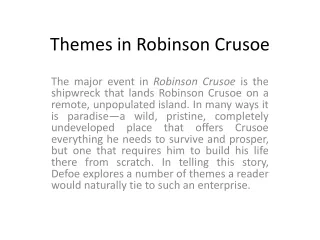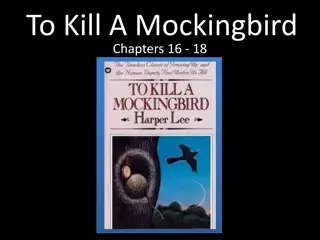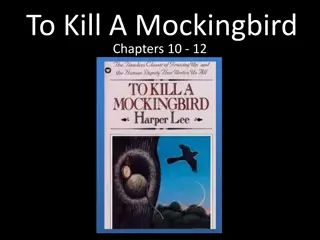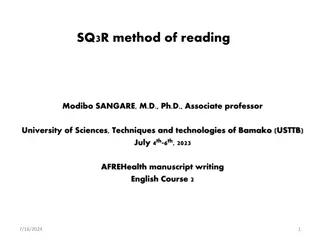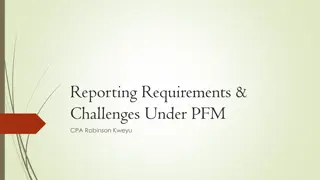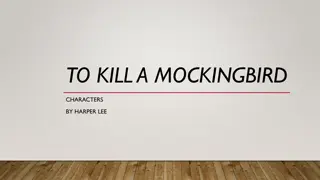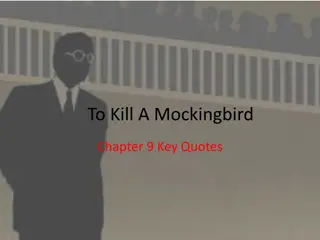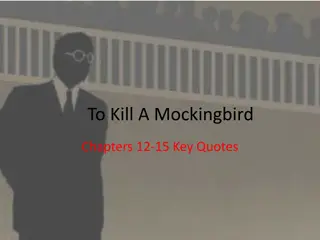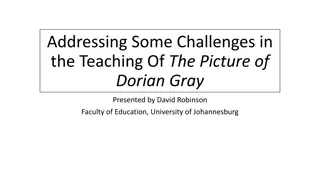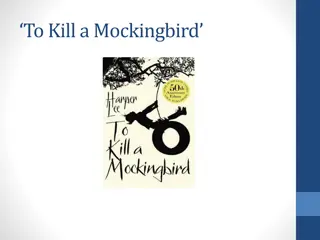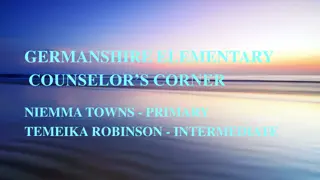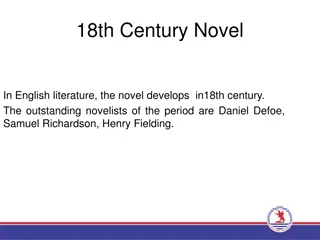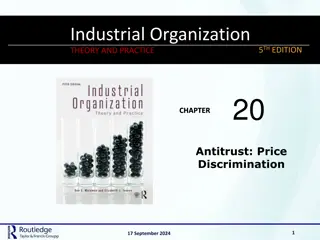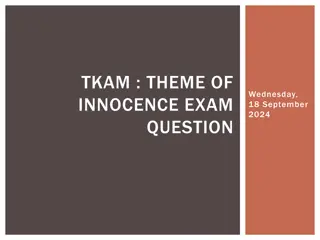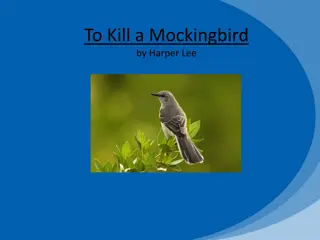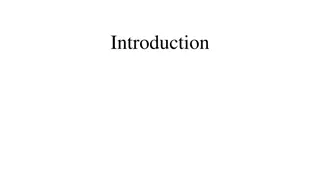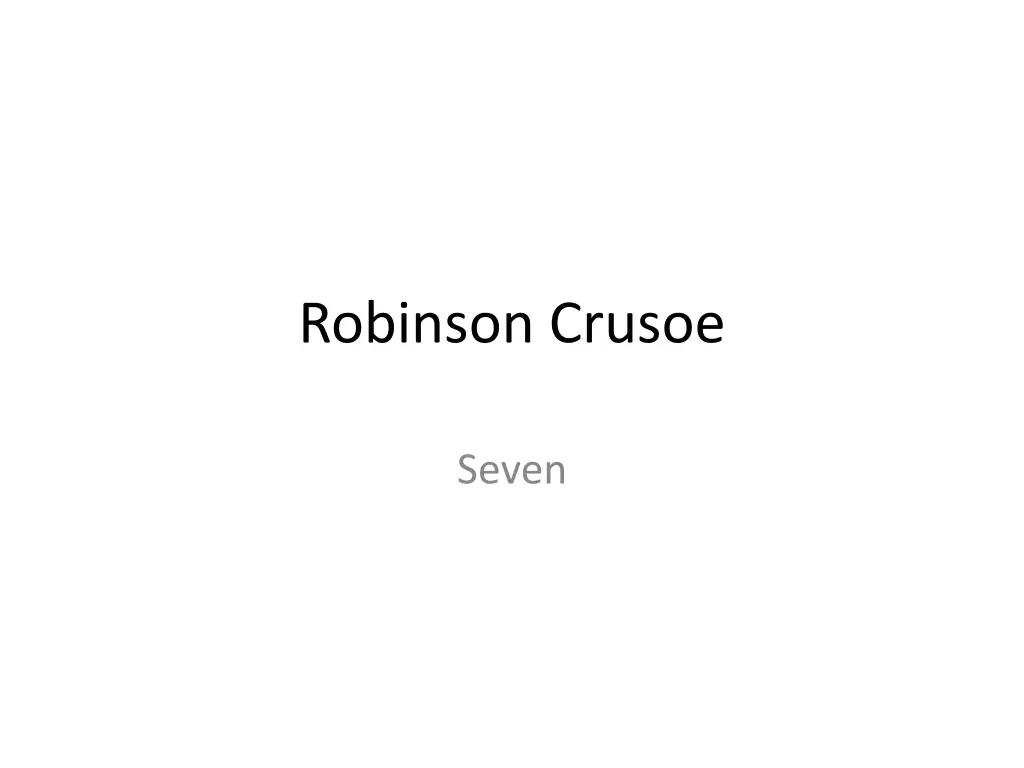
Robinson Crusoe's Island Adventures
Join Robinson Crusoe on his solitary island where he rules as king, encounters mysterious footprints, fears lurking dangers, and stumbles upon chilling scenes of cannibalistic rituals. Explore the complexities of colonization, survival, and solitude in this classic tale.
Download Presentation

Please find below an Image/Link to download the presentation.
The content on the website is provided AS IS for your information and personal use only. It may not be sold, licensed, or shared on other websites without obtaining consent from the author. If you encounter any issues during the download, it is possible that the publisher has removed the file from their server.
You are allowed to download the files provided on this website for personal or commercial use, subject to the condition that they are used lawfully. All files are the property of their respective owners.
The content on the website is provided AS IS for your information and personal use only. It may not be sold, licensed, or shared on other websites without obtaining consent from the author.
E N D
Presentation Transcript
Robinson Crusoe Seven
IT would have made a Stoic smile to have seen me and my little family sit down to dinner. There was my majesty the prince and lord of the whole island; I had the lives of all my subjects at my absolute command; I could hang, draw, give liberty, and take it away, and no rebels among all my subjects. Then, to see how like a king I dined, too, all alone, attended by my servants! Poll, as if he had been my favourite, was the only person permitted to talk to me. My dog, who was now grown old and crazy, and had found no species to multiply his kind upon, sat always at my right hand; and two cats, one on one side of the table and one on the other, expecting now and then a bit from my hand, as a mark of especial favour. What does the underlined sentence show? Is the island now Crusoe s colony?
It happened one day, about noon, going towards my boat, I was exceedingly surprised with the print of a man's naked foot on the shore, which was very plain to be seen on the sand. I stood like one thunderstruck, or as if I had seen an apparition. I listened, I looked round me, but I could hear nothing, nor see anything; I went up to a rising ground to look farther; I went up the shore and down the shore, but it was all one; I could see no other impression but that one. I went to it again to see if there were any more, and to observe if it might not be my fancy; but there was no room for that, for there was exactly the print of a foot - toes, heel, and every part of a foot. What does that incident refer to? Does it foreshadow some following incidents?
Abundance of such things as these assisted to argue me out of all apprehensions of its being the devil; and I presently concluded then that it must be some more dangerous creature - viz. that it must be some of the savages of the mainland opposite who had wandered out to sea in their canoes, and either driven by the currents or by contrary winds, had made the island, and had been on shore, but were gone away again to sea; being as loath, perhaps, to have stayed in this desolate island as I would have been to have had them Whom is Crusoe afraid of?
When I was come down the hill to the shore, as I said above, being the SW. point of the island, I was perfectly confounded and amazed; nor is it possible for me to express the horror of my mind at seeing the shore spread with skulls, hands, feet, and other bones of human bodies; and particularly I observed a place where there had been a fire made, and a circle dug in the earth, like a cockpit, where I supposed the savage wretches had sat down to their human feastings upon the bodies of their fellow-creatures. What could we recognize from that scene? Does that reveal anything about the colonizing attitudes of the author? Does Defoe want to express a specific message?
These considerations really put me to a pause, and to a kind of a full stop; and I began by little and little to be off my design, and to conclude I had taken wrong measures in my resolution to attack the savages; and that it was not my business to meddle with them, unless they first attacked me; and this it was my business, if possible, to prevent: but that, if I were discovered and attacked by them, I knew my duty. On the other hand, I argued with myself that this really was the way not to deliver myself, but entirely to ruin and destroy myself; for unless I was sure to kill every one that not only should be on shore at that time, but that should ever come on shore afterwards, if but one of them escaped to tell their country-people what had happened, they would come over again by thousands to revenge the death of their fellows, and I should only bring upon myself a certain destruction, which, at present, I had no manner of occasion for. Upon the whole, I concluded that I ought, neither in principle nor in policy, one way or other, to concern myself in this affair: that my business was, by all possible means to conceal myself from them, and not to leave the least sign for them to guess by that there were any living creatures upon the island - I mean of human shape. What does Crusoe decide to do?
Religion joined in with this prudential resolution; and I was convinced now, many ways, that I was perfectly out of my duty when I was laying all my bloody schemes for the destruction of innocent creatures - I mean innocent as to me. As to the crimes they were guilty of towards one another, I had nothing to do with them; they were national, and I ought to leave them to the justice of God, who is the Governor of nations, and knows how, by national punishments, to make a just retribution for national offences, and to bring public judgments upon those who offend in a public manner, by such ways as best please Him. This appeared so clear to me now, that nothing was a greater satisfaction to me than that I had not been suffered to do a thing which I now saw so much reason to believe would have been no less a sin than that of wilful murder if I had committed it; and I gave most humble thanks on my knees to God, that He had thus delivered me from blood-guiltiness; beseeching Him to grant me the protection of His providence, that I might not fall into the hands of the barbarians, or that I might not lay my hands upon them, unless I had a more clear call from Heaven to do it, in defence of my own life. What is Crusoe s moral justification behind that decision? Does he indirectly publicize or defend colonialism?
It was now the month of December, as I said above, in my twenty-third year; and this, being the southern solstice (for winter I cannot call it), was the particular time of my harvest, and required me to be pretty much abroad in the fields, when, going out early in the morning, even before it was thorough daylight, I was surprised with seeing a light of some fire upon the shore, at a distance from me of about two miles, toward that part of the island where I had observed some savages had been, as before, and not on the other side; but, to my great affliction, it was on my side of the island. What did Crusoe note?
Upon this, however, I made this conclusion: that my only way to go about to attempt an escape was, to endeavour to get a savage into my possession: and, if possible, it should be one of their prisoners, whom they had condemned to be eaten, and should bring hither to kill. But these thoughts still were attended with this difficulty: that it was impossible to effect this without attacking a whole caravan of them, and killing them all; and this was not only a very desperate attempt, and might miscarry, but, on the other hand, I had greatly scrupled the lawfulness of it to myself; and my heart trembled at the thoughts of shedding so much blood, though it was for my deliverance. What does that reveal about Crusoe s personality?
While I was thus looking on them, I perceived, by my perspective, two miserable wretches dragged from the boats, where, it seems, they were laid by, and were now brought out for the slaughter. I perceived one of them immediately fall; being knocked down, I suppose, with a club or wooden sword, for that was their way; and two or three others were at work immediately, cutting him open for their cookery, while the other victim was left standing by himself, till they should be ready for him. In that very moment this poor wretch, seeing himself a little at liberty and unbound, Nature inspired him with hopes of life, and he started away from them, and ran with incredible swiftness along the sands, directly towards me; I mean towards that part of the coast where my habitation was. What does the narrative tell about the natives/colonized?
It came very warmly upon my thoughts, and indeed irresistibly, that now was the time to get me a servant, and, perhaps, a companion or assistant; and that I was plainly called by Providence to save this poor creature's life. I immediately ran down the ladders with all possible expedition, fetched my two guns, for they were both at the foot of the ladders, as I observed before, and getting up again with the same haste to the top of the hill, I crossed towards the sea; and having a very short cut, and all down hill, placed myself in the way between the pursuers and the pursued, hallowing aloud to him that fled, who, looking back, was at first perhaps as much frightened at me as at them; but I beckoned with my hand to him to come back; and, in the meantime, I slowly advanced towards the two that followed; then rushing at once upon the foremost, I knocked him down with the stock of my piece. Why does Crusoe decide to save the savage/Friday?
I hallooed again to him, and made signs to come forward, which he easily understood, and came a little way; then stopped again, and then a little farther, and stopped again; and I could then perceive that he stood trembling, as if he had been taken prisoner, and had just been to be killed, as his two enemies were. I beckoned to him again to come to me, and gave him all the signs of encouragement that I could think of; and he came nearer and nearer, kneeling down every ten or twelve steps, in token of acknowledgment for saving his life. I smiled at him, and looked pleasantly, and beckoned to him to come still nearer; at length he came close to me; and then he kneeled down again, kissed the ground, and laid his head upon the ground, and taking me by the foot, set my foot upon his head; this, it seems, was in token of swearing to be my slave for ever. Does that show anything about the relation between the colonizer and the colonized? Comment
He was a comely, handsome fellow, perfectly well made, with straight, strong limbs, not too large; tall, and well-shaped; and, as I reckon, about twenty-six years of age. He had a very good countenance, not a fierce and surly aspect, but seemed to have something very manly in his face; and yet he had all the sweetness and softness of a European in his countenance, too, especially when he smiled. His hair was long and black, not curled like wool; his forehead very high and large; and a great vivacity and sparkling sharpness in his eyes. The colour of his skin was not quite black, but very tawny; and yet not an ugly, yellow, nauseous tawny, as the Brazilians and Virginians, and other natives of America are, but of a bright kind of a dun olive-colour, that had in it something very agreeable, though not very easy to describe. His face was round and plump; his nose small, not flat, like the negroes; a very good mouth, thin lips, and his fine teeth well set, and as white as ivory. What can readers conclude from that description?
In a little time I began to speak to him; and teach him to speak to me: and first, I let him know his name should be Friday, which was the day I saved his life: I called him so for the memory of the time. I likewise taught him to say Master; and then let him know that was to be my name: I likewise taught him to say Yes and No and to know the meaning of them. I gave him some milk in an earthen pot, and let him see me drink it before him, and sop my bread in it; and gave him a cake of bread to do the like, which he quickly complied with, and made signs that it was very good for him. I kept there with him all that night; but as soon as it was day I beckoned to him to come with me, and let him know I would give him some clothes; at which he seemed very glad, for he was stark naked. As we went by the place where he had buried the two men, he pointed exactly to the place, and showed me the marks that he had made to find them again, making signs to me that we should dig them up again and eat them. At this I appeared very angry, expressed my abhorrence of it, made as if I would vomit at the thoughts of it, and beckoned with my hand to him to come away, which he did immediately, with great submission. Describe the image that Defoe has drawn for the colonizer and the colonized? What are the cultural colonization
Colonial discourse is a system of statements that can be made about colonies and colonial peoples, about colonizing powers and about the relationship between these two. It is the system of knowledge and beliefs about the world within which acts of colonization take place.
Colonial Binary Oppositions The binary logic of imperialism is a development of that tendency of Western thought in general to see the world in terms of binary oppositions that establish a relation of dominance. A simple distinction between centre/margin; colonizer/colonized; metropolis/empire; civilized/primitive represents very efficiently the violent hierarchy on which imperialism is based and which it actively perpetuates. Binary oppositions are structurally related to one another, and in colonial
Hegemony The term is useful for describing the success of imperial power over a colonized people who may far outnumber any occupying military force, but whose desire for self-determination has been suppressed by a hegemonic notion of the greater good, often couched in terms of social order, stability and advancement, all of which are defined by the colonizing power. Hegemony is important because the capacity to influence the thought of the colonized is by far the most sustained and potent operation of imperial power in colonized regions.

